The Fire and the Vanities
On Defamation, Magic Realism, Shunning and the Slow Clotting of Time
If you believe in free speech, here’s the bad news: it isn’t actually free. It costs $5 a month. That’s less than the latte you complain about, less than the Netflix shows you’ll never watch, and far cheaper than your last regrettable bar tab.
For that, you get three essays a week, open comments, and the satisfaction of knowing you’re funding uncensored writing in a world addicted to censorship. Everyone says, “It’s just the price of a cup of coffee.” Fine.
But here’s the pitch: give me your coffee money and I’ll hand you something stronger—essays with bite, arguments with teeth, and the freedom to say what others won’t.
Subscribe today. Because silence is free—and it’s worth exactly what you paid for it.
The song “The Fire and the Vanities” is one I wrote and arranged — about the devastation of having an academic reputation destroyed by deliberate defamation.
Vanities in their original sense meant vapours: fleeting, elusive essences, a chasing after the wind. Ecclesiastes declares, “All is vanity,” capturing that sense of futility and transience. The fire comes from the letter of James, where the tongue is called a small spark that sets a vast forest ablaze — an image of gossip and defamation spreading until it consumes everything in its path.
Originally written in November, 2024, rewritten in September 2025
It is late November, and I am in my basement. Time has begun to clot. Not stop, not freeze, but clot—slowing, irregular, lumping together in ways that defy the smooth stream of days. The unopened newspapers are still in their translucent blue plastic sheaths, thrown onto the driveway and often kicked beneath a car to protect them from the rain.
Their plastic proclaims their newness, but most are from the early summer, scarcely worth reading now, like opening a book when someone has already told you the ending.
They lie sealed—symbols of days likewise not opened, not explored, and left ponderously still.
I used to read the paper, even when I taught eleven courses at two universities, when I was so busy that I barely slept, when every moment was filled with work, motion, and productivity.
My two Westies breathe steadily on the brown leather couch, muzzles resting on short white paws.
Against the wall leans the trunk that carried my grandmother’s possessions across the ocean from Donegal.
On top of it, a slouched pile of unopened mail, envelopes bent, as though the messages inside already knew their futility. Only one thing stands upright: a portrait of my father, three weeks before his sudden death, holding my puppy, Malibu.
Dad’s eyes are clear and unsentimental. Perhaps he was hiding his ill health from us.
The portrait does not bend. Everything else bends. My days are but a breath. The vanities rise and curl, wisps of steam, trailers of smoke—things you cannot hold, yet they choke the room.
The fire began quietly. One day, I was teaching; the next, I was summoned to Room 401.
The door opened onto a heavyset man, arms crossed, standing like a sentry in the human resources department.
The Assistant Vice-Provost did not greet me as a colleague of thirteen years. He looked at me as though he had never seen me, as though a passerby had asked, “Do you know this man?” and he had denied it.
His tie sat crooked, his collar damp with sweat, and he had pushed his chair as far away from the table as possible. The HR person was too nervous even to sit, hovering behind her chair like a schoolchild waiting for the headmaster. Between them lay a single sheet of paper, limp and unimpressive, yet treated as sacred writ.
The room itself felt staged for humiliation: the blinds half-closed, stale coffee in paper cups, the hum of fluorescent lights. There was no conversation. Only the pronouncement: you are suspended, banished, gagged. The paper itself became the executioner. Here is your exile, get out.
I packed my office in silence, past the spiral staircase, past the plant wall, out the side door, into the parking lot. No goodbyes, because there were none. A career, a purpose - ended with a whisper: he is gone. My days are but a breath.
The vanities gathered, like trailers of smoke curling through stone halls, whispering yet untouchable. The flow of time clotted there too, congealing and slowing.
The grotesque comedy is that a university—an institution supposedly consecrated to reason—behaves like a star chamber: those secret courts of Tudor England, remembered not for justice but for show trials, where the verdict was drafted in advance and the accused was permitted only the courtesy of attending his own ruin. So it is here: charges are not plainly set out, evidence is not presented, and witnesses are never named. What the institution traffics in is defamation—rumour refined into decree, lies repeated until they fossilise into truth.
First, they solicit gossip. Administrators and their hirelings fan out not to gather facts but to harvest malice. Can you say something negative about him? That is their research method.
Second, gossip is transmuted into institutional defamation. Investigators—hired pens with neither conscience nor shame—accept hearsay as gospel. If A denies, but B insists he “heard it,” then B is believed. The lie is elevated, the truth discarded. They wanted a hanging, so they bought the rope.
Third, defamation becomes the weapon itself. This is not justice misshapen but injustice perfected, and defamation is its currency. The provost, the deans, the vice-provosts—delicate in their titles, brutal in their methods—deploy investigators to launder rumour into verdict. They mouth “balance of probabilities,” but the only thing balanced is the fee against the ruin of a career. Defamation is not a byproduct; it is the product.
And the aim is not only to ruin one but to terrify all. Strike down a few with grotesque accusations, and the rest will police themselves. Censorship enforced from above becomes self-censorship from within, until the whole faculty falls silent. It is a lesson every despot knows: flog one dissenter in the square and you’ve gagged the entire village. (One might almost admire the efficiency, if it weren’t carried out by people who still insist on calling themselves educators.)
And so the accusations are not merely false but vile by design: Pedophile. Violent criminal. Words chosen for their ability to stain forever. The police were never called—because everyone knew the charges were lies. But that is the genius of defamation: it requires no proof.
Once seeded, it spreads naturally. It metastasises in the bloodstream of an institution, carried eagerly by faculty who find gossip more nourishing than evidence. To defame is easier than to reason, and far more fun.
Meanwhile, the accused is left under its own weight. This is the true power of defamation: not its suddenness but its slow corrosion. Days clot together, newspapers remain unopened, time congeals into dread.
And the questions—why this hatred, why the silence, why the refusal to reason—become their own burden. “Vanity of vanities, saith the Preacher, vanity of vanities; all is vanity.” The vapours of those questions fill the basement like steam rising from a pot of rice; a thin arc of vapour escapes, curling, dissipating into nothing.
Defamation does not silence; it suffocates. The smoke thickens; reason lies in ashes. And still the empire of rumour, smug in its robes, dares to call itself a university.
A university that trades in defamation is no university at all, but a factory of lies with a degree mill bolted on. They call it higher learning; in truth, it is lower gossip, notarised by management and sold as a verdict.
What followed was not silence but fire: defamation, that cruel flame without substance. The faculty and staff told students that I had been led away in handcuffs.
The VP, I found out a month later, was not merely a bureaucrat but the top administrator, as if the president of the university, someone I had never met, never worked with, and yet someone who had signed her name as claimant in a human rights complaint against me.
She had no standing to file as Claimant, but when the human rights manager is two rungs down on you in the pecking order, you tend to get what you want.
That VP was surely, along with my accuser, one of the only hands that could have set these wretched defamations in motion, for her words and her claim, written within hours of my suspension, matched the defamations perfectly. There was no other reasonable conclusion.
The top administrator of the university had, without cry or fanfare, almost with the absent click of a keyboard, declared war on me.
Staff whispered that she admitted to them that any judicial process was nothing but Potemkin signage — flimsy cardboard facades masking the real engine beneath.
Behind the curtains, the cold machinery of injustice clattered on: a grinding contraption of gears and wheels, bureaucrats shovelling paper into its furnace like coal, each memo and affidavit sparking more smoke.
The whole machine ran not on evidence but on prejudice, humming with the static of antisemitism and quiet, cultivated hatred.
My great sin, again, was to insult Hamas; I had called them Nazis in a private conversation.
The University of Guelph now elevates Hamas over Israel.
I would not recant. I had stood outside the gates of Dachau at twenty, staring at the barbed wire and the silence, and I was not about to betray my Jewish friends decades later with cowardice.
So the sparks leapt, and that is all it takes. Each retelling fanned the flame, until the whole forest was aflame—a rumour of handcuffs, academic record, the best in the department, but impugned, and so-called “Christians” fueling the flames? There were no Christians involved.
A whisper of violence. Someone said, I heard there was something sexual involved. A rape? That morsel passed from mouth to mouth, savoured like a secret sweet, swallowed whole without question. A hint of threat, and soon the air itself was burning. Fire consumes without evidence, and its smoke is nothing more than vanities—faint and ethereal, yet choking.
Defamation burned through the hallways. If truth were the only fuel, this was a fire without wood or spark. The vanities swirled in the smoke—accusations that vanished when seized, charges that dissolved on contact—yet still they thickened the air, stinging eyes, choking throats, leaving only ash where reason once stood.
The flames licked at the edges of every conversation, unspoken but felt, a heat that told you which words were forbidden and which were sanctified. In that warped economy, my words were a crime, theirs were a credential.
The fire fed itself. Defamation needs no proof, only breath. Each whisper another gust. The vanities swirled, smoke choking, vapour vanishing at touch.
I asked managers to halt the lies. They said they were too busy recording grades and, it seemed, tallying tuition revenue — as if the whole enterprise were no longer a university but a credential factory.
The truth was that learning had no place there anymore; they had sold their souls for filthy lucre, trading scholarship for spreadsheets.
I had had enough; I needed to see a human. I once visited the campus, specifically the union office itself.
It was closed.
The halls were nearly empty; for twenty minutes, I walked through old offices, and people were polite. They smiled and spoke pleasantly, as though nothing were amiss. I left my number.
The next day, a letter arrived, its tone more suited to be directed at someone who had stormed onto campus like a wild dog, lurching from room to room—the punishment: a trespass order, with a fine of ten thousand dollars if I were to return.
The rage in its sentences was unhinged, as though I had appeared in Viking armament and rampaged through the student lounge, slicing cushions and tearing the dying plants from the wall.
In truth, I had spoken politely with several staff members for twenty minutes, but the letter portrayed me as a criminal, a menace, and an intruder. Yet another stranger’s judgment, cut and pasted, as if God had whispered in their ears that the halls I had walked a thousand times were now forbidden ground.
The strategy? Shun him. Never reply. Never acknowledge. Shun as lepers were shunned, outside the camp. Shun as Job was shunned: “My relatives have gone away, my closest friends forgotten.” Shun and shun more - is not the one forgotten like one who is dead?
Without exaggeration, the “investigation” was a farce. One meeting in twenty months, and that was the sum of it. She never sought out my witnesses, never touched the exculpatory evidence, and never bothered with the particulars. Her report was a skeleton of procedure — no flesh, no truth, just the stiff grin of bureaucracy pretending it had teeth.
She seemed almost irritated by the need to perform the ritual, like a notary forced to recite a play she’d grown weary of. Once, she even said, blunt as a gavel, that I would have no defence — so why attend?
When the final condemnation came, it arrived through the dim lens of a Zoom call. Her face loomed close, her eyes gleaming with the cold satisfaction of someone who already knew the ending. As she spoke, the light of the screen seemed to release smoke — faint at first, curling along the edges of her jaw, then thickening, drifting outward. It seeped across the screen, over my desk, into my room. I could almost smell it, acrid and heavy, curling into my lungs, stinging my eyes.
The smoke was not metaphor but presence: the visible shape of lies made fleshless, the vapours of accusation without substance. It thickened until it blurred the books on my shelves, the unopened newspapers on the floor, even the two Westies asleep on the couch beside me.
The verdict was never in question. It had been written long before she appeared, long before the first word was spoken. This was not justice but tinder, dry words feeding a blaze already alight. And I, forbidden to name the fire, was left to sit still as the smoke filled my house, rising and swirling until it seemed the very air I breathed belonged to them.
You are compelled to play along in this tawdry play—cheap, tacky, poorly written, badly staged, awkwardly acted—and still you must perform your role. You know the ending before the script begins, but you are made to bow on cue.
The pain was knowing all along that it was set up, that there was no chance, that the words I spoke carried no weight, yet I still had to sit, nod, and answer, as though the ending had not already been decreed. The university had ordered a report not to discover but to excuse.
It was a prop, a shield for their silence. Later, they never read my appeals, never sought out my witnesses, and never let me speak, for they could instead point to the paper they had paid for.
A fake investigation, a fake report, written not to test truth but to echo defamation, to codify gossip as if it were fact. And with that report in hand, they could go on shunning me—answering nothing, hearing nothing, speaking nothing—because the condemnation had already been purchased, printed, and stamped with their seal.
It was judgment, but it was not judicial. Judicial means a weighing of evidence, an examination, a hearing of the parties, and a cross-examination. But this—this was not that. This was judgment without inquiry, condemnation without trial, a verdict written before the charge was named.
Earlier, I remembered how I had sat in CAMH (Canadian Association of Mental Health). The doctor I was to see? They called her a miracle worker. I waited four hours. When she entered, I gave her the three-minute version: that I had condemned Hamas, that I had said I stood with Israel, and that the simple phrase — “if you stand with Hamas, you stand with Nazis” — was enough to make the University of Guelph collapse on top of me.
The false miracle worker’s body stiffened. Her chin rose. Her eyes hardened. “Hamas are not the government of Gaza,” she snapped. Not a diagnosis. Rebuke. My wound became her politics. I told her politics should not guide medicine. I left.
Another doctor later said I had PTSD, caused fully, with this point confirmed by a WSIB investigation, purely by the harassment and abuse of the noble university.
So four hours for a door that never opened. Another gust for the fire, another wisp of vanities, the futility of trying to hold their vapours. Time itself staggered in that waiting room, clotting in the stale air, the hours lumpy and misshapen, until nothing could be measured.
Meanwhile, the university receded into bureaucratic fog. Now and then, a letter would arrive from one of their hired thugs—lawyers, of course—thundering with hubris, threats, and pretension, yet saying nothing. These were not vapours, not a chasing after the wind; they were crafted to intimidate.
And in the realm of their primitive brutality, their aggression stripped away the pretence and revealed, with startling clarity, the malice at the core.
The trespass order and the police warnings were not born of violence but of crude invention—never pursued, never tested. They were kindling only, tossed on the fire of defamation so the blaze might leap higher, spread faster, and consume without restraint.
Colleagues averted their eyes in the market. Students whispered. Friends recoiled. Every silence was another shunning, every evasion another veil of smoke.
Defamation is vanity of vanities. You cannot seize it. You cannot summon it to court, certainly not against a University that has already spent almost one million dollars on lawyers and other expenses to fight you, and has hundreds of thousands still to burn.
You cannot clutch vapour or command retraction; it slips through the fist. It is everywhere and nowhere, scorching reputations, friendships, institutions, until only ash remains. The fire burns, but the smoke kills. My days are but a breath.
Time clots here too—irregular, fractured: nights on the brown leather couch, the sun dragging itself up like a reluctant witness, half-ashamed, as though it had seen too much and sworn to say nothing.
My two Westies, Toby and Malibu, would lie beside me like small, stubborn sentries, their breath rising in clouds that seemed to join the smoke already choking the room. I typed out appeals and defences that dissolved on the screen before my eyes, words turning to ash at the edges, curling away like burnt paper.
My wife, daughter, and son hovered in worry, while my mother-in-law, brisk and devoted, pressed a bowl of kasha into my hands—as though porridge could steady a man set ablaze.
I return to the basement. The newspapers lie sealed in their blue sheaths, symbols of days gone by, yet unopened. The trunk leans against the wall, my grandmother’s voyage sealed within. The portrait of my father remains upright, the last thing unbent.
The Westies now sleep, their breath steady, a gentle rhythm of trust. But around me still swirl the vanities, vapours of gossip, smoke of rumour, wisps of silence.
My days are but a breath.
Time has begun to clot, and what I thought would hold together has wisped into faint, swirling, ethereal vanities. The fire rages, and the vanities remain.
And yet, even as the smoke thickens and the haze mingles with my breath, there is a stubborn sense—and I know it is not without reason, for it is by faith—that every wisp of vapour that mocks any grasp will vanish. For these fumes, insubstantial, fragile, fleeting, will pass.
And today, what seems irrevocably bent will in due reckoning be made straight and useful.
For though, yes, now it seems the air may dance with vanities that frustrate—those cursed mists and plumes that slip through grasping hands—I am assured that one day they will depart, there will be substance, and we will see what endures.
Then there will be no more vapours, no further lamentations at the futile clutching of the vanities; only clarity, substance, and truth.
And in such clarity every deed will be seen, every act understood, every work made plain for what it is—good or evil.
So let the vanities depart. For in the end, we will find substance. And every deed will be named for what it is.
If you value this work, consider leaving a tip. It’s cheaper than therapy, less pious than public broadcasting, and the only censorship here is my bad taste. On second thought, it’s bad therapy.




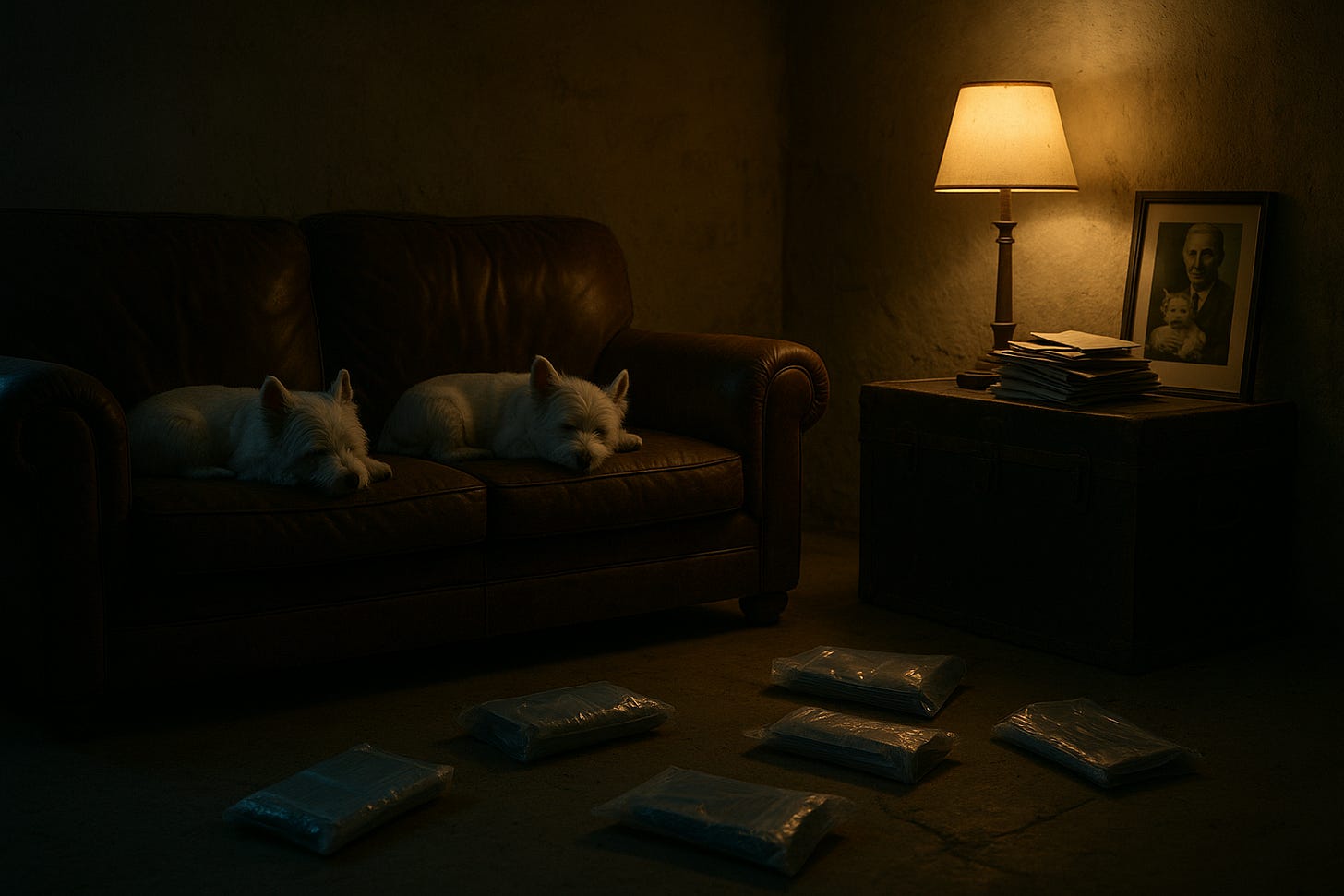
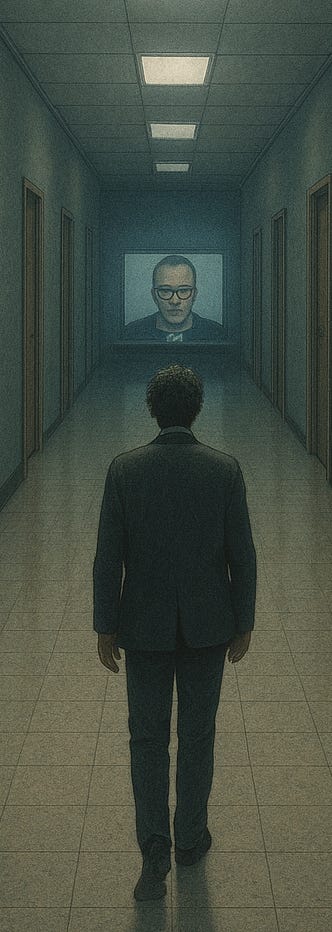
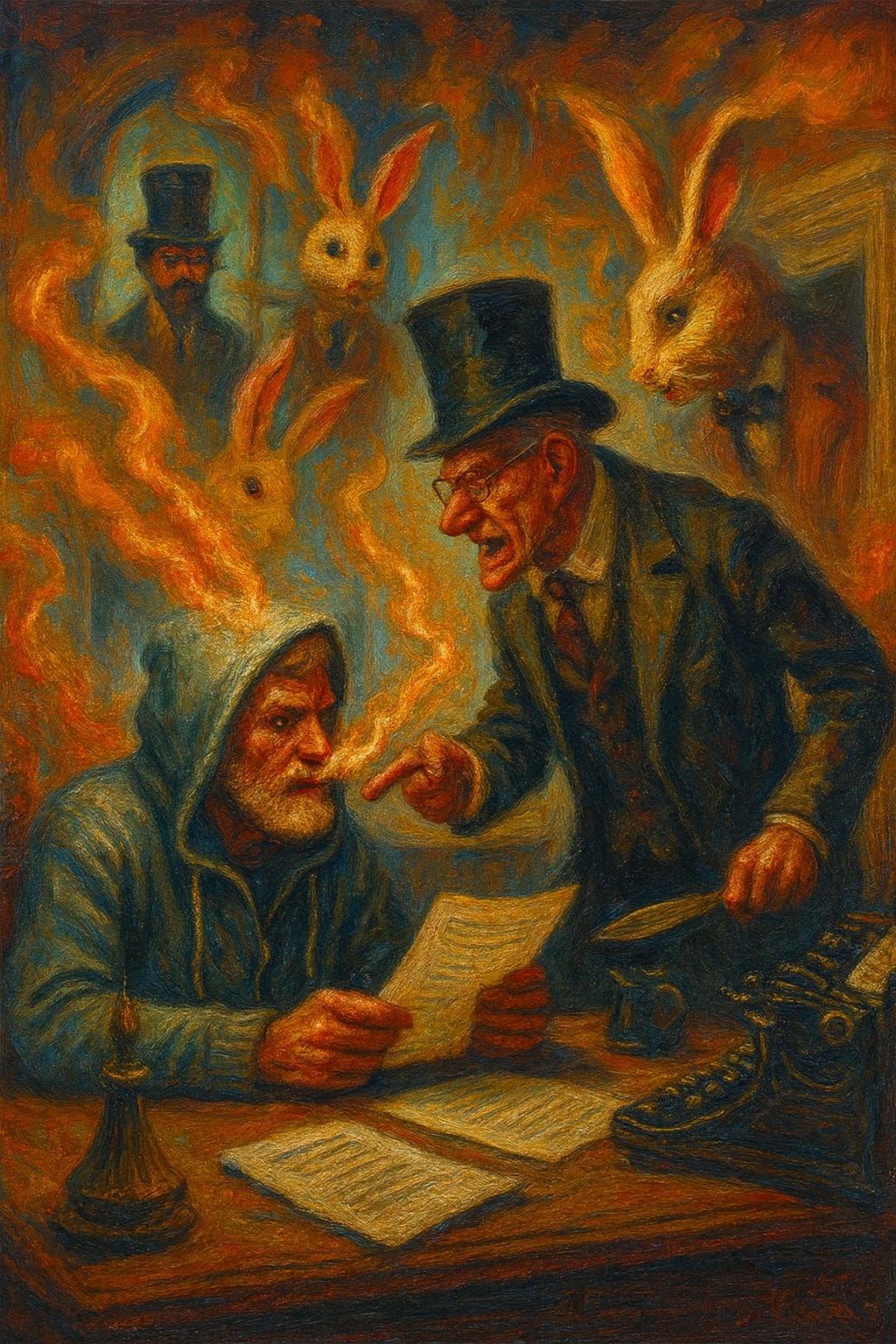
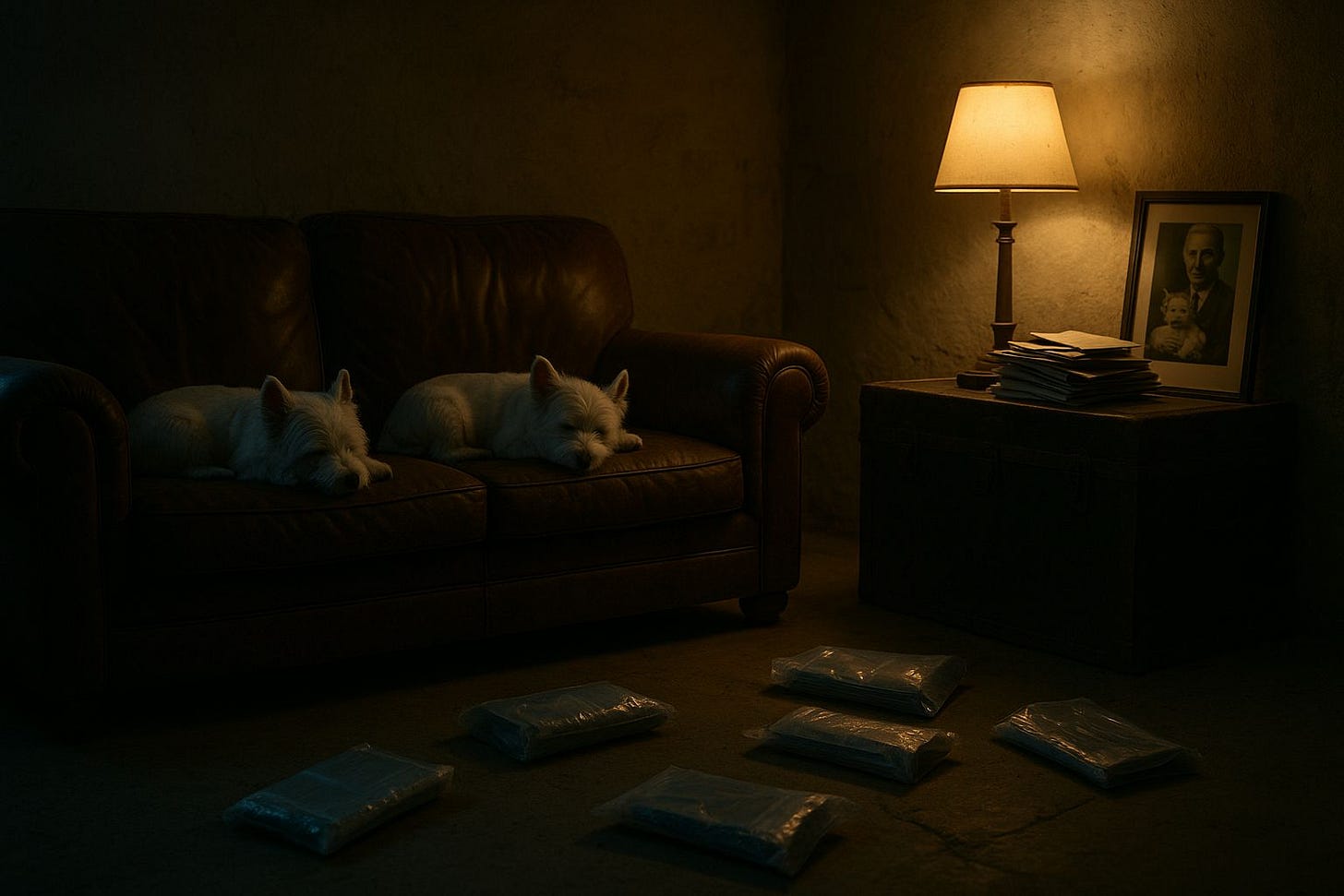
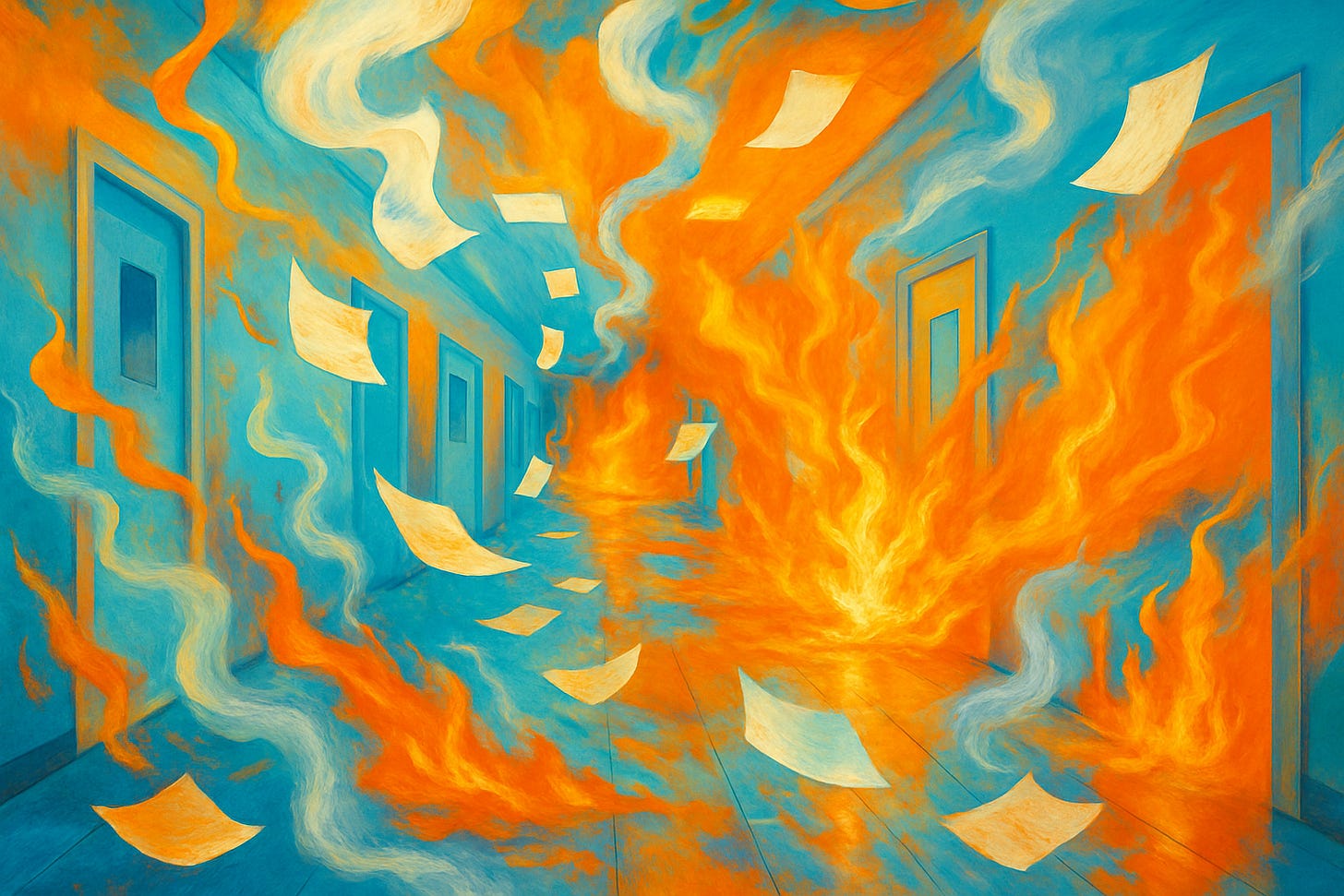

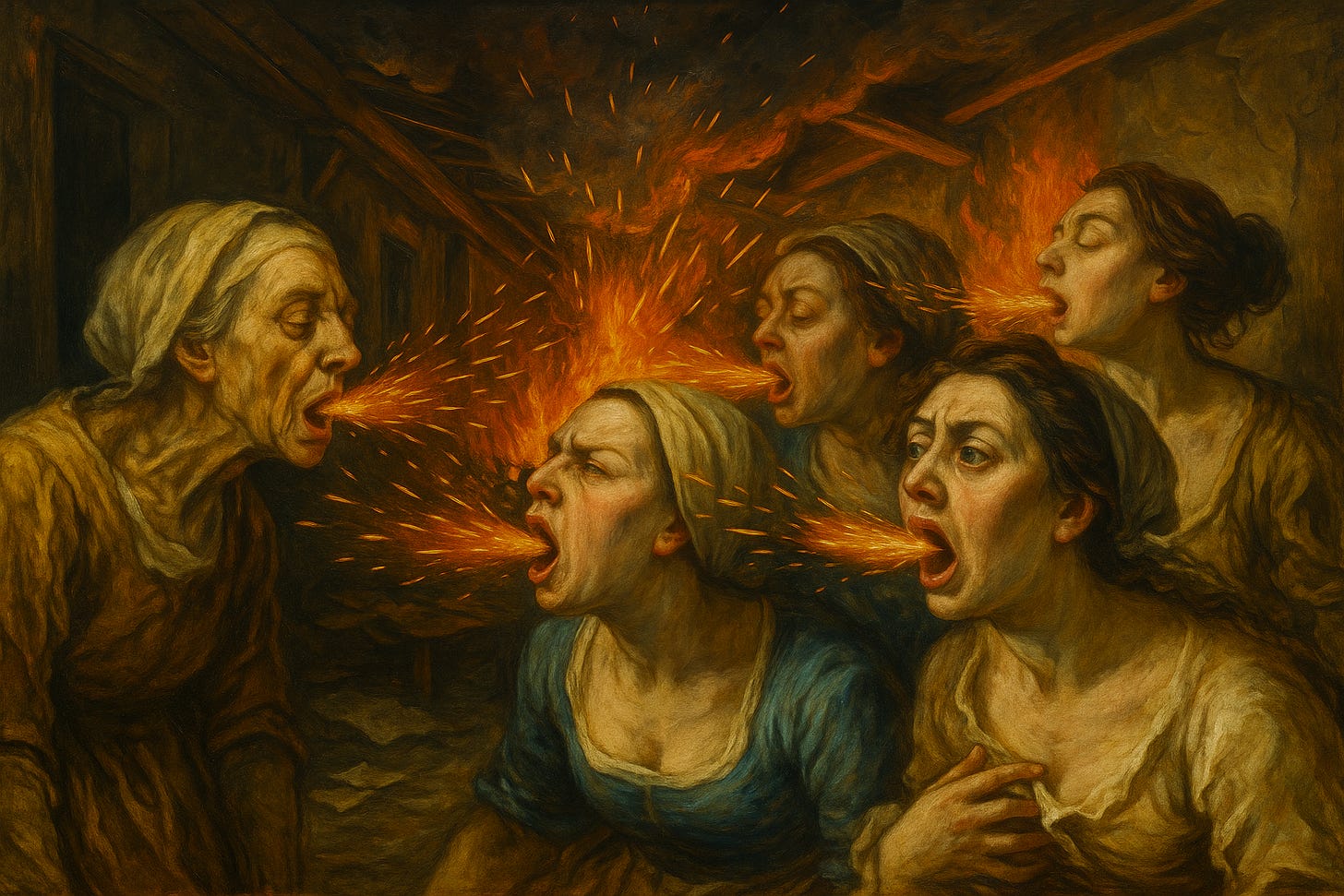
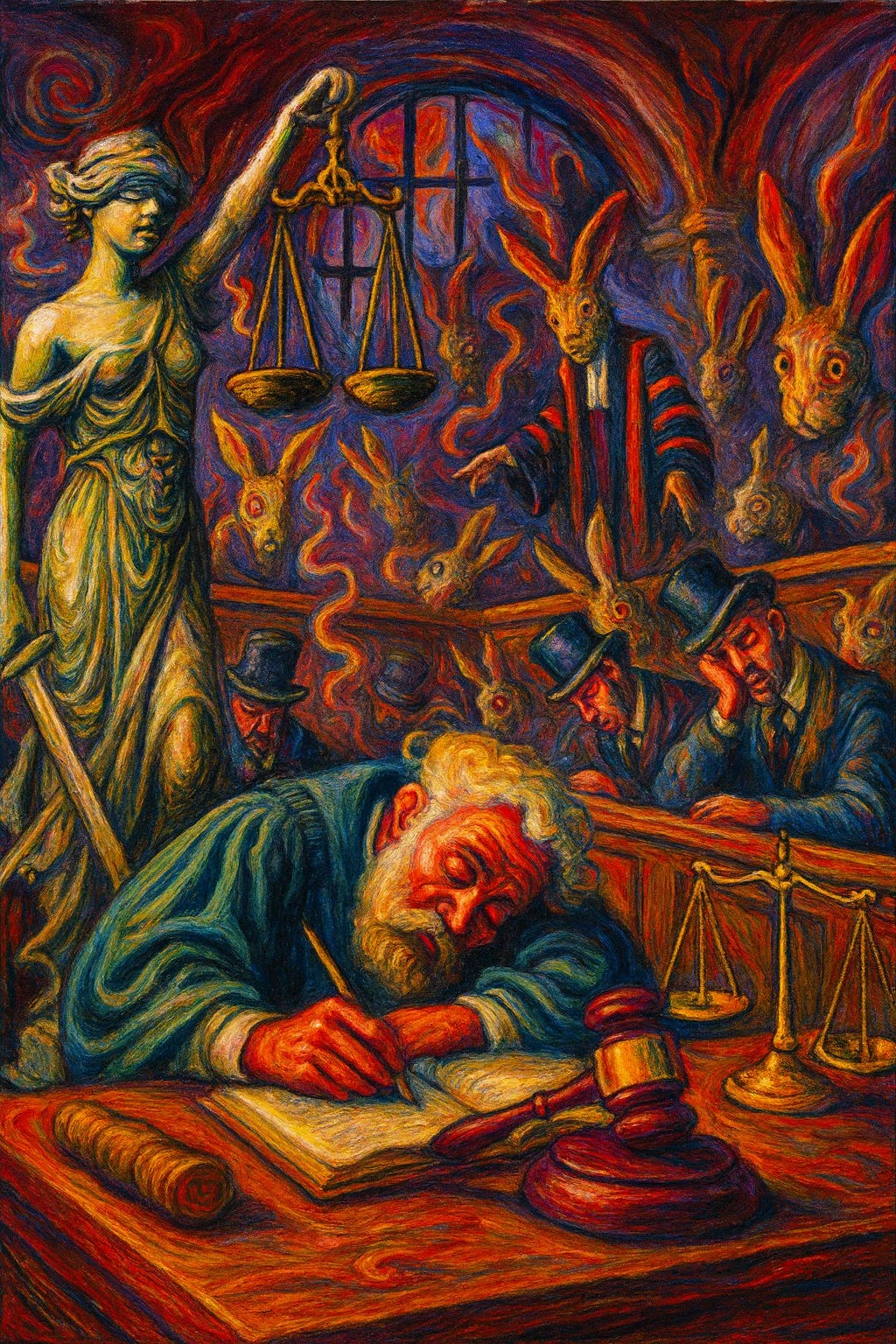

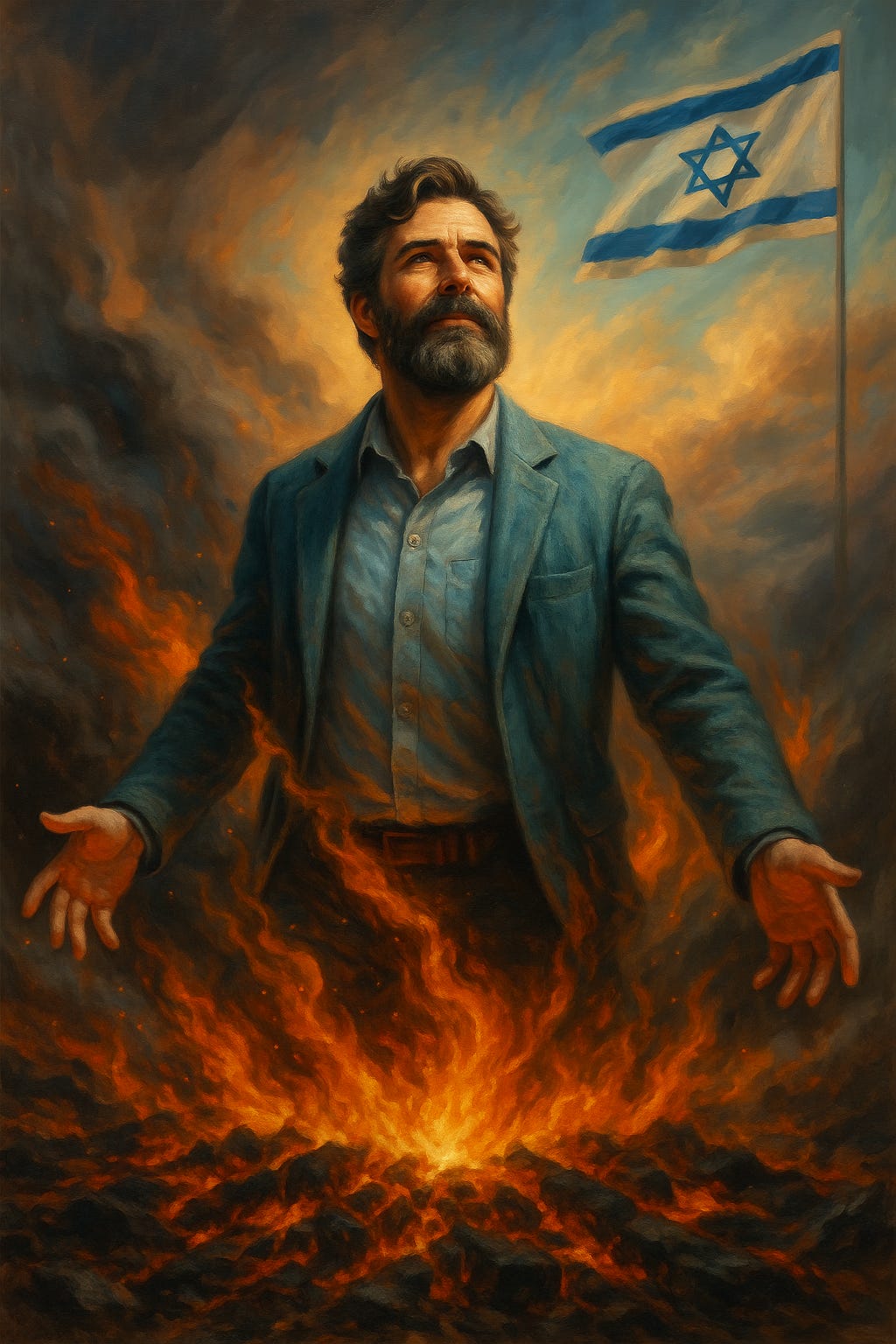

Your writing is paradoxically both intelligently coherent and detailed, and a primal scream. Very impressive and disturbing. Thank you for this window on your corner of the world. I wish you strength and good fortune.
I truly hope justice will prevail for you and all those with a moral compass.
Hamas lovers are a sick breed and the Universities are rife with them. May you transition to a new reality where people will once again express their appreciation for your integrity, professionalism and expertise. In the mean time, know that your character is filled with integrity and you are on the right side of this disgusting misguided administration as well as the bigger battle of darkness and light.
We stand with you, Paul, FWIW.